Moving from London to the Bay Area and what changed
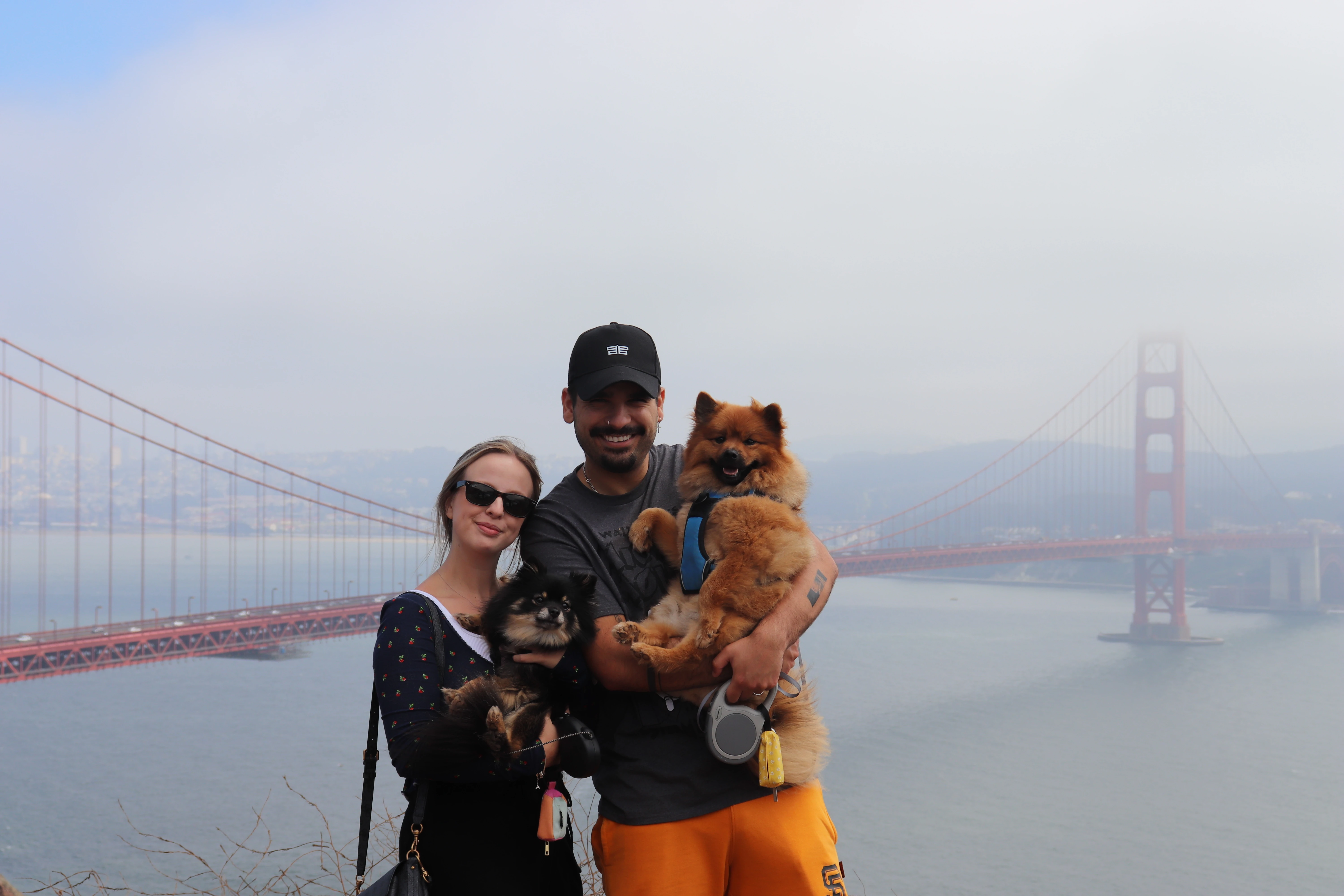
The culture shock from moving to the Bay Area from London.
A few months ago, I wrote a blogpost about what was needed in order for my wife and our 2 dogs to move to the Bay Area from London. You can check that blog post here.
Since then, I’ve had some people asking me after living in the Bay for 1 year, what are the biggest differences I’ve experienced in terms of lifestyle & culture.
I will write a section below for each of the major topics I experienced. Note that this is based on my experience, and you may disagree/have different opinions than me on some of these - which are very welcome.
Living costs
Back in 2016 when I was at university, in Portugal, I used to pay 200 euros/month to live in an apartment with a roommate. My university cost was 800 euros/year and my parents gave me a monthly allowance of 300 euros/month to pay for food and anything else. I didn’t do many activities and would rarely go out, so I was able to live comfortably on that.
Once I moved to London (in 2017) to pursue a MSc. at Imperial College I was paying 1.6k £/month for a studio in Earl’s Court. This was walking distance from Imperial (didn’t have to pay for transportation) and was cheaper than the accommodations that the university offered. The university was no longer 800 euros/year, it cost £11k for the entire MSc (1 year).
So there was a shock that I experienced in terms of living costs from Lisbon to London.
Once I decided to move to the Bay Area (2023) I knew that the living costs were going to be higher, but in my head “how higher can these be?”.
Oh boy.
Apparently, a lot.
Shopping

This was the first shopping trip I had in the Bay (Whole foods is the equivalent to Waitrose in London, I often still confuse them and my wife finds it funny - anyway, they call it whole paycheck here bc $$$). These 10 items cost me $69.34. I couldn’t believe it.
Costco is arguably my favorite shop. It’s like a better IKEA. We would spend at least 2 hours shopping but we would get supplies for 3 weeks, the famous hot dog/pizza combo and put gas in the car. The membership (120$/year) pays itself really fast at Costco. The main downside is that since we were only 2 and I hate throwing food out, it happened a few times that I had to adapt my meals to make sure no food would go to waste. E.g. Eat a guacamole pack a day since the smaller pack brings 24 and it there were 24 days until the expiry date.
PS: I like Costco so much that I always took the friends/family who visited to it, as if it was an attraction. Sometimes we would even go directly to Costco from the airport, to breathe in Costco and all its magnificence upon arrival :D

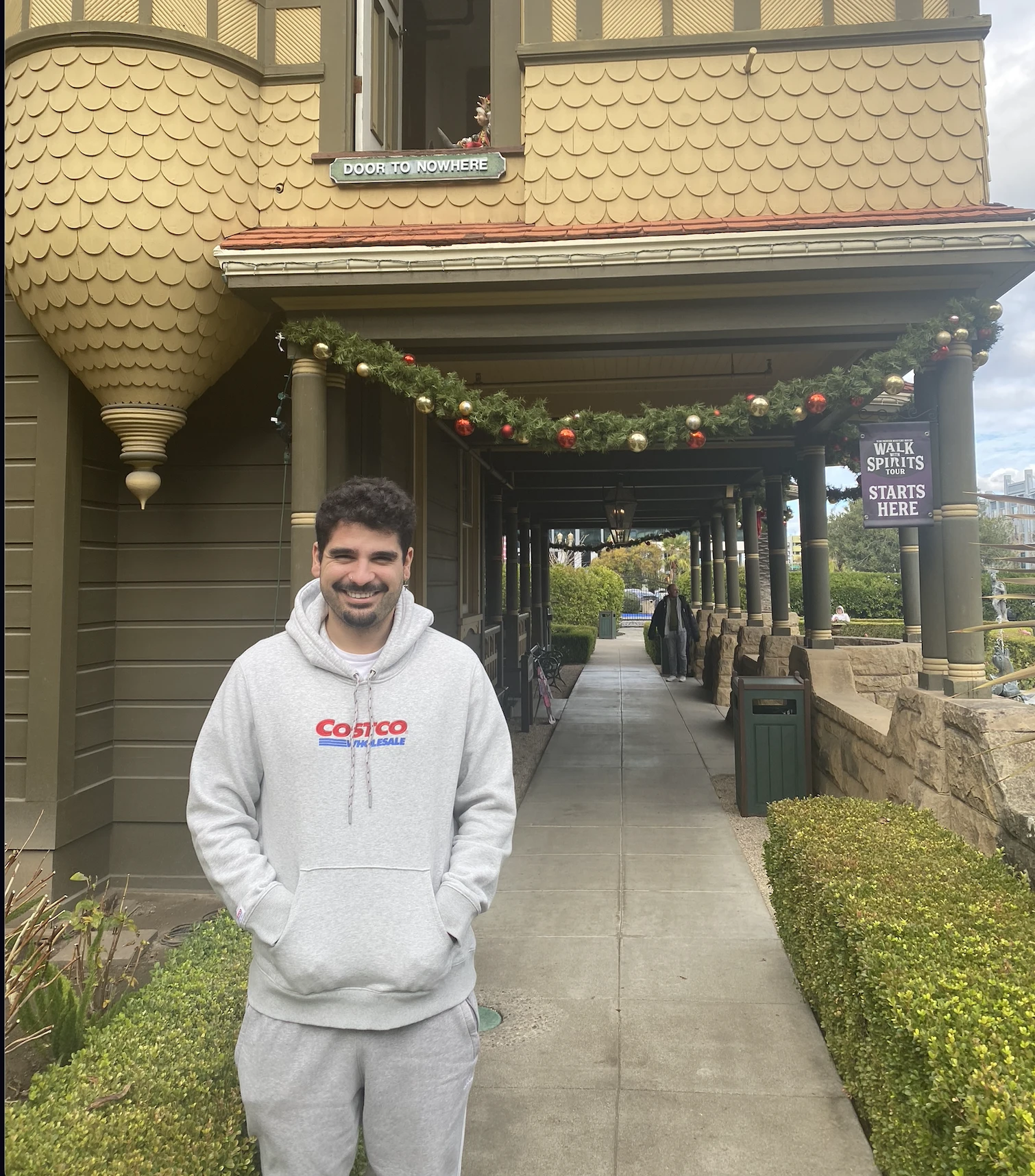
Apartment
Since I went to the US with the sole purpose of working hard and making OpenBB successful, I ended up picking a nice apartment in San Mateo - given that we spend 90% of our time at home. Our monthly rent for a 2-bedroom flat was 4.4k $/month with everything included (including both dogs rent, lol).
The apartment had a small gym, a common pool & bbq area and an outdoor hot tub. But more importantly, it was located right by 101, walking distance from Peets & Starbucks and very pet friendly. In addition, I was 40m from SF, 10m from the airport and 20m from Palo Alto. This meant that we were in a very calm area whilst being close to the most important hubs.
The common pool and BBQ area (+ the sunny weather) were insane, sometimes I wish I had spent more time there. But I guess you tend to value things more when you don’t have them :)

Tipping culture
In Europe, I very very rarely tipped. Not just me, but all people I know. It’s just not part of our culture. Everything is factored in. Even in London, most restaurants will have a “service charge” which is kind of a tip BUT it’s included in the bill and so you don’t need to think about how much you are going to tip.
In the US, if you don’t tip - people will judge you. The system is done in a way that tipping is not a “should” but closer to a “must”. Workers rely on your tips when thinking about their total compensation. And now I understand why my friends who work in restaurants/cafes enjoy Americans so much, it’s because they bring their tipping culture to Europe and so that extra money is very meaningful for European folks.
Some rules that I follow:
- If I go to a coffee shop and just do takeaway, I don’t tip. If I sit down in a table, then I tip between 15-20%.
- When in a restaurant, I always tip. But the percentage varies based on the quality of the service and food. If I didn’t like it, I still tip 10%. If I really enjoy it then I tip 20%. If it was just good, I do 15%. This is a rule of thumb. In practice, I do this but then round to a multiple of $5 because yes (this is the equivalent to my wife not allowing odd numbers as the TV volume).
The best way to get used to this is to just internally assume that 20% extra cost on whatever you are seeing on the menu. If a burger + drink costs $30, assume it will be $36 after taxes and tip.
Note that in restaurants they expect you to leave your credit card on the top of the bill. This is so they can “freeze” the bill and once they bring the receipt back they will wait for you to add the amount for the tip (+ total). Once you fill this and sign (in theory, the signing is mandatory) - only then they will be able to withdraw the bill amount + the tip.

Sports
Growing up in Portugal I used to watch every Benfica game and then in high school you would talk about the games you watched during the weekend. There was no other sport, it was a binary - either you are a soccer fan or you don’t watch any sports at all. When I moved to London, this changed slightly, there were people that liked other sports but Soccer was still the main sport by a very big margin. People would fill up a pub to watch Soccer only - maybe the other sport that came closest was Cricket.
In the US, people don’t really care about Soccer. It feels like it’s a sport that kids do, but adults don’t really talk about it or watch it. They know about Messi/Ronaldo, but aren’t really fans. On the other hand, American football, Basketball and Baseball are very big. Aquatic pole also seems to be popular in the Bay Area.
I remember when we got the apartment, I was walking my dogs and there was a soccer pitch nearby. I was super happy because I thought that I could do what I used to do in London and just show up to the ground on the weekend and do a pick-up play with random folks. Unfortunately, after several attempts of walking nearby I realized that the pitch was only used for kids to play soccer and never adults. In London, on a sunny day, it’s hard (maybe impossible?) to find a soccer field empty.
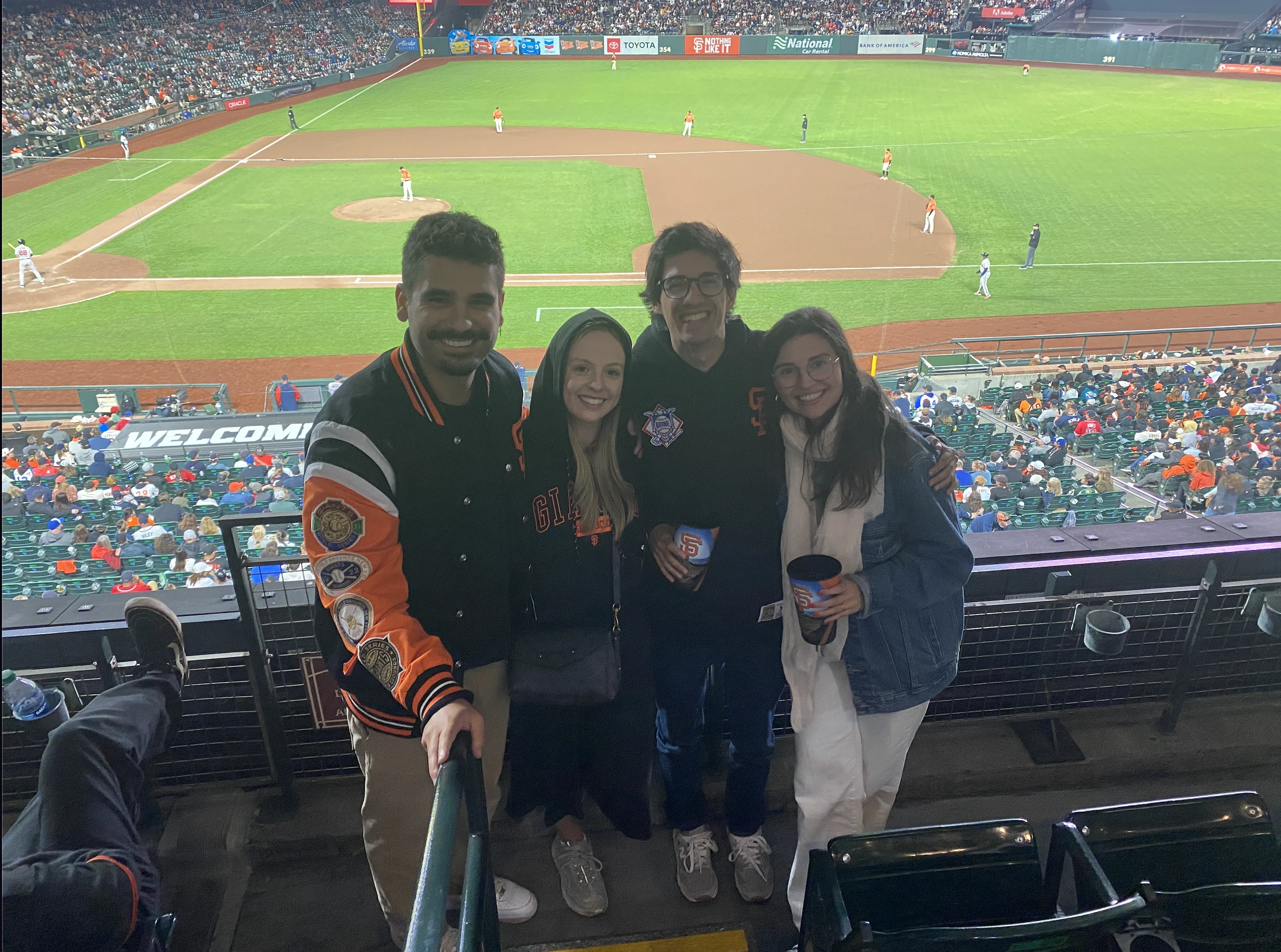
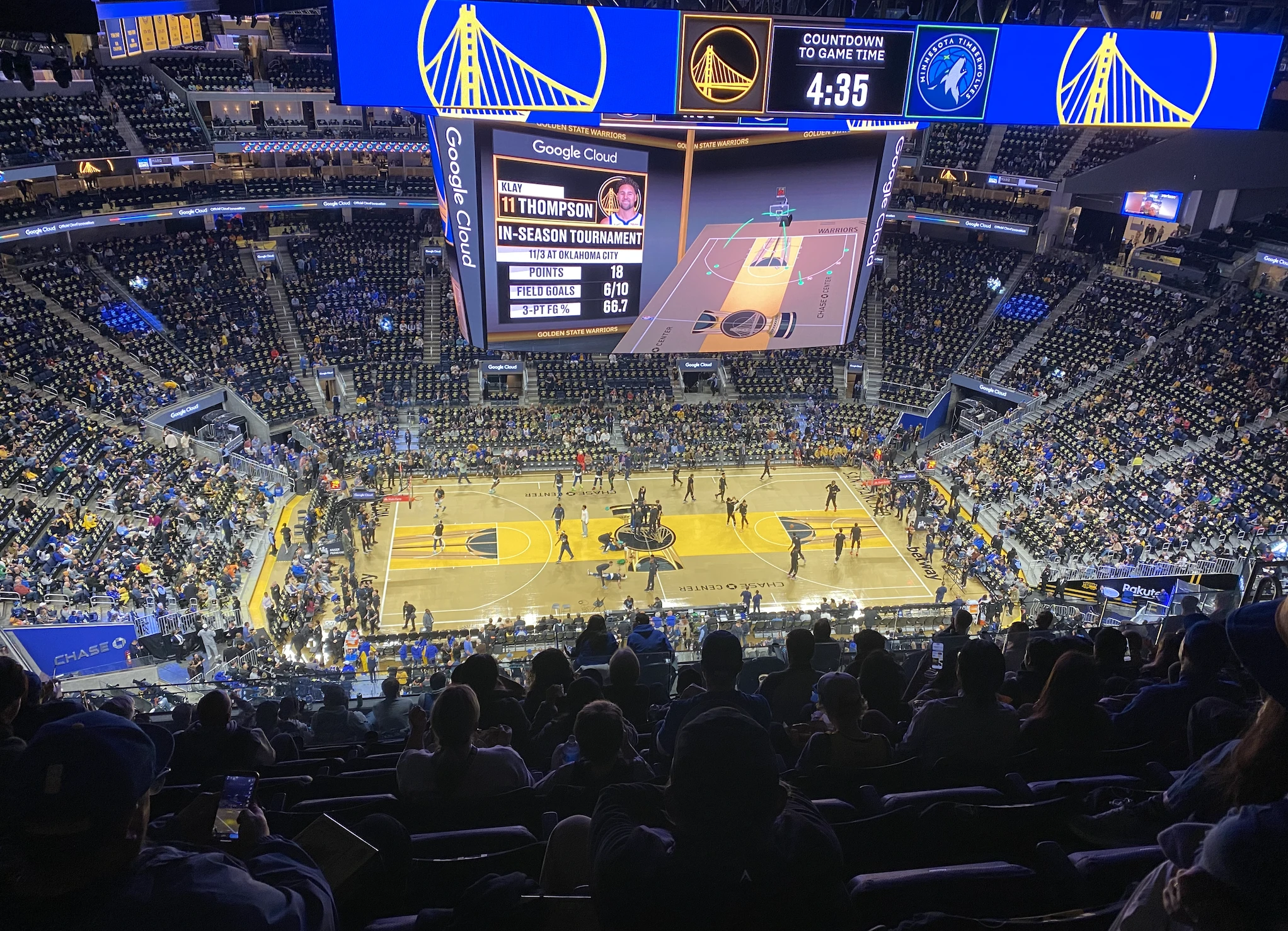
College sports
While in Europe in general, no one cares about college sports. The reality in the US is completely different. Not only do they fill their stadiums with 50k+ people, but these games bring a TON of money. People will literally sit outside the stadium in the morning and wait for the time of the match. It’s called tailgating.
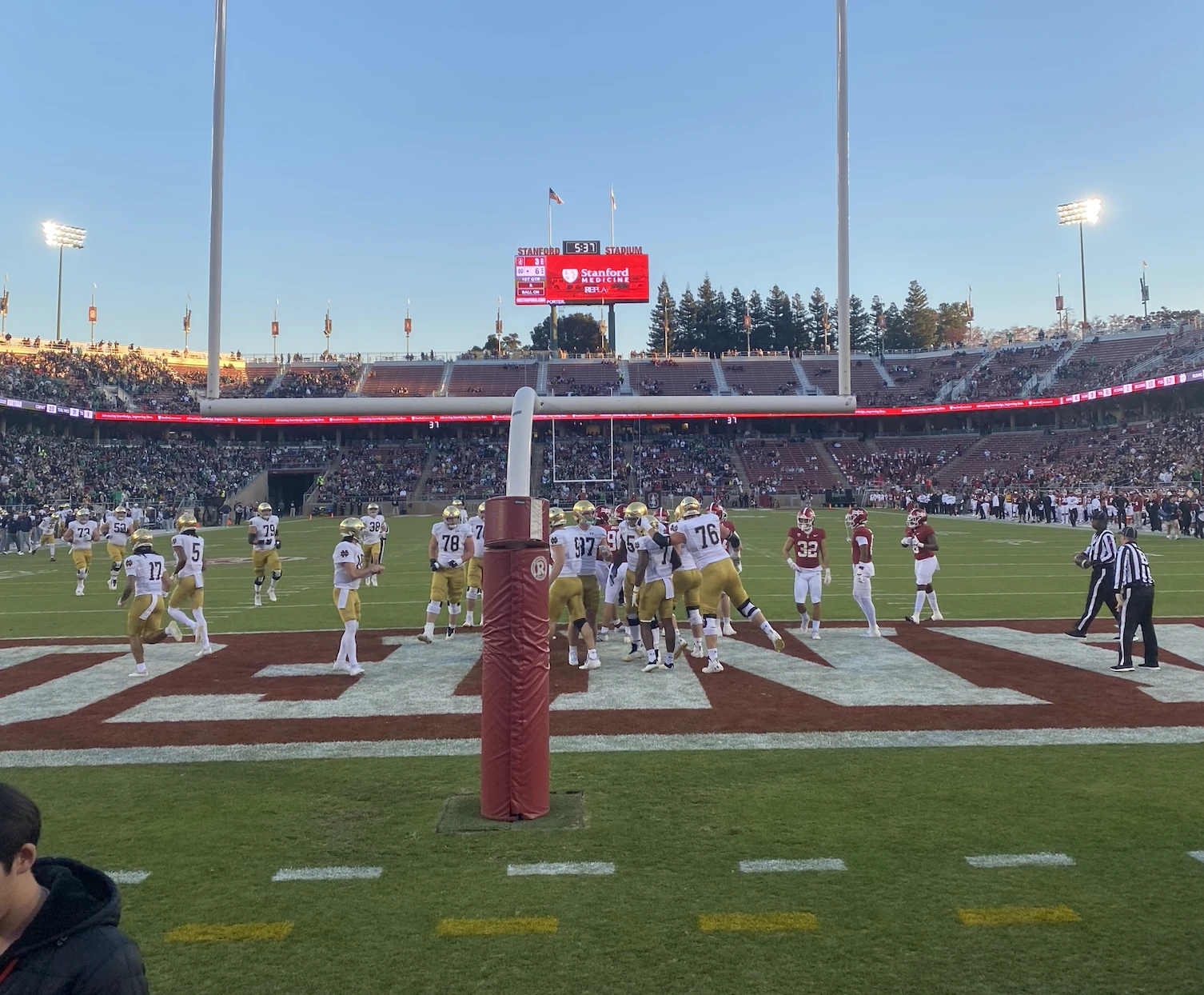
I’ve noticed that some people don’t even go to the stadium, they just sit outside the stadium watching the game in the car park on their TV and drinking. I still don’t fully get why you would do that, but I guess it’s a tradition.
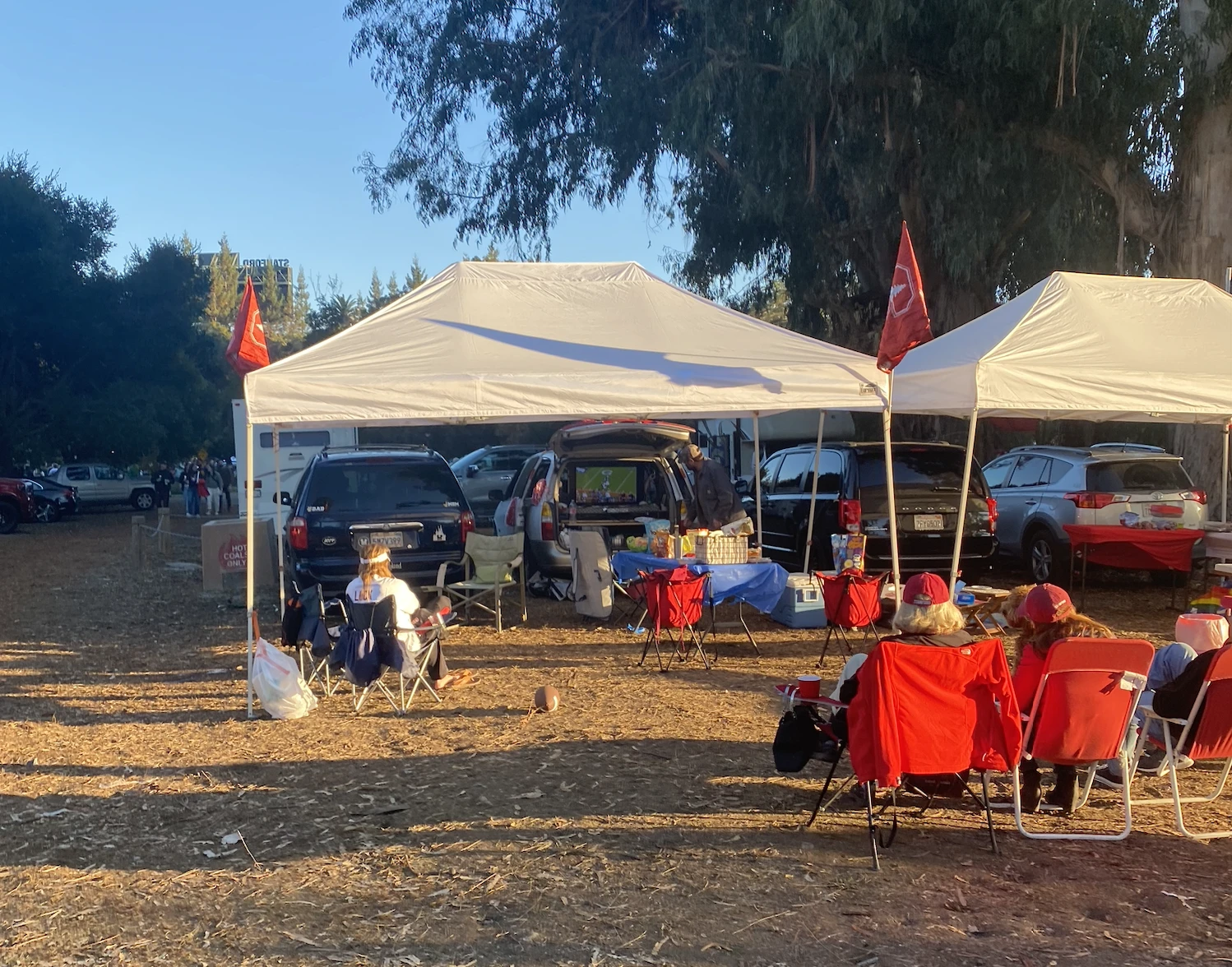
Working Culture
My plan was to live in the US for the duration of my visa (O-1) and then return after 3 years. But the working culture is the reason why I hope to stay for longer. Most people you will meet in the Bay work very hard. They don’t finish the day at 5/6pm but do long hours to get shit done. What motivates them is building the future and being part of something bigger than themselves.
In London, I felt like the culture was very strong towards finishing your working day and going to the pub at 5/6pm - get drunk. And then repeat. Before London I didn’t drink alcohol, and in London I started drinking sometimes to socialize. In the Bay I feel like there isn’t an expectation that everyone wants to drink, and people leave events early because they want to head home to work on something - which is something I used to do back in London.
I also feel like in the Bay Area, when you go to events you can talk about what you are working on without people judging you for bringing “work” into the conversation. And I tend to find these conversations more interesting. In London, there’s less emphasis in tech, and the interests tend to be a bit broader: music, arts, history, etc..
While people say that London is a big hub for startups & founders, I didn’t find this to be the case. In the Bay Area, the likelihood of you encountering someone on the street and them working at a startup (most of the time their own) is really high. You can even feel the strength of this tech community on Twitter, whereas that doesn’t exist (AFAIK) in London.
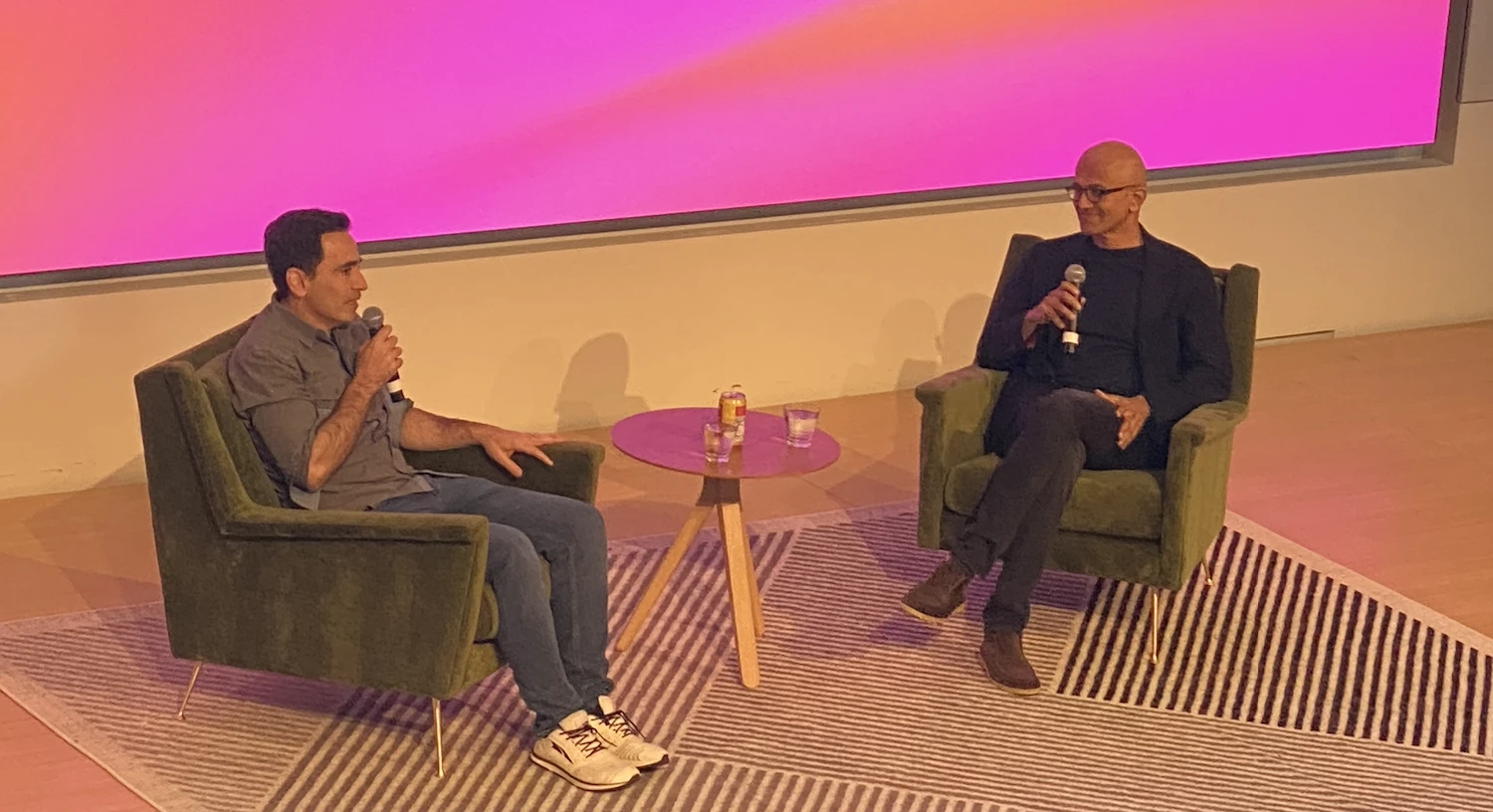
Elad Gil fireside with Satya Nadella at Stripe's HQ
Equity as part of compensation package
Most European startups do not offer any equity. In the Bay Area, all startups offer equity. The earlier you join (higher risk) the more meaningful the options you get are. One of the reasons this works is because US employees are, in general, hard-working and will go the long way for their company. So this makes it so that incentives are aligned, and employees want to work harder because that equity can become much more meaningful than their base salary (potentially life-changing).
One of the reasons this works so well is that pretty much every US person knows someone in firsthand who made f-u money by selling their shares in secondaries, or has at least heard stories about this. While I was in the UK, before starting OpenBB, I didn’t hear about this once. Also because companies have no interest in offering you equity if they don’t have to.
E.g. at my previous startup I used to stay working late into the night, because in my perspective this would increase the startup's chances of success. However, I had no equity. So this meant that if the startup was wildly successful, I would have no direct gains from it and the company would not owe me anything. Offering equity through a typical 4-year vesting schedule (with 1-year cliff) provides the perfect type of alignment.
Holidays
The amount of holidays is a good example that demonstrates the hard-working culture that so well characterizes the US. In the US they are used to having 2-weeks off in a full calendar year. In London, most companies offer at least 4-weeks, which is effectively 2x the number of holidays.
Driving culture
The London underground works impressively, I lived there for 5 years and never once even considered owning a car.
I thought I could do the same in the US and people were being dramatic. That thought lasted maybe 2 days?
On the first day I had to go to Fedex which was a 15-20m walk, and when I told the apartment administrator that I was going to walk there she looked at me like I was crazy and said “you need to take your car”. After walking there I understood what she meant and that unless you are in a city, the pedestrian sidewalks/roads just aren’t prepared for pedestrians.
Differences
- You drive on the right (x2) side of the road. Since I didn’t drive in the UK, this was very easy for me as I’m used to driving in Portugal where we also drive on the right side of the road.
- In the UK (or Europe, in general) having more than 3 lanes on the highway is atypical. In the US, having 6 lanes it’s considered normal. Sometimes it’s tricky and you can’t be in the most right side because the 2 right lanes may both exit and thus you need to hop over 2 lanes to keep on the same route. This mistake can be costly.
- There are very very few roundabouts in the Bay. There are a LOT of intersections. I like it less (not because I think it’s slower) but because it’s more “boring” to wait for the green light and from my point of view, people are more likely to grab their phone during that time because they don’t need to pay as much attention, at least compared to a roundabout where you are waiting for an opening to keep moving. (there are so few roundabouts that the first time I saw one I took a picture to share with my wife)
- There’s a “Right on Red” policy. This means that if you are at an intersection and it’s red for you to proceed if there’s no incoming car from the left side you can turn right on the red. I like this because it allows for traffic to flow better. My wife doesn’t like it because as a pedestrian sometimes cars start accelerating and don’t respect pedestrian as much. Nonetheless, I love to make this joke when people from Europe visit, where I say that I’m going to pass a red and they are shocked when they see me turning right on a red light.
- In the Bay they have FastTrack which allows people to pay to use the most-left lane and avoid traffic. Although this is capitalist I like it because if I’m in a rush I can pay a few dollars to avoid the congestion - it’s a type of SaaS - Speed as a Service 😄
Waymo
Waymo, a self-driving car division that started off Google, was the first startup I applied to when I finished university. I have been bullish on self-driving cars since university - my dissertation was on that topic and I had to propose it myself, since there were no proposals for such. So seeing Waymo operating in SF was mind-blowing to me.
Autonomous cars are a matter of time - and SF (and the Bay Area) being the city where Waymo starts operating, shows a lot about how progressive this city is. I recommend everyone to try one out.
My dad, someone who was born and raised in a small town in Portugal, and who understands very little about technology seeing this was something. Him seated in the passenger’s seat for the full 16 min drive recording a wheel with no driver and ending the journey telling me “I never thought I would see this in my life, thank you” is something that no amount of money in this world could buy.

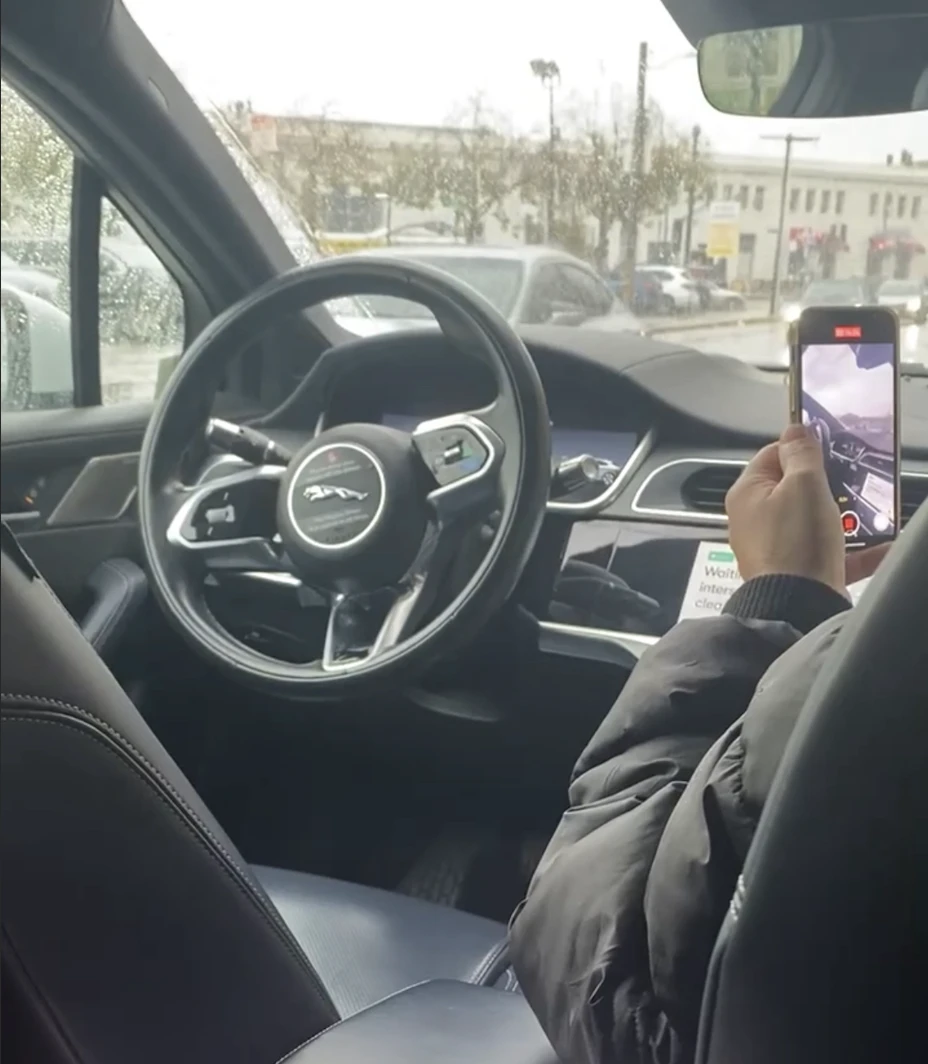
Driving license
Even though I have a Portuguese driving license since I was 18. That’s only accepted for 10 days or so - and if you have an international driving license for it to work for longer (I didn’t go this route). So I had to apply for a California Driving License (CDL) which meant taking a written exam and doing a driving test.
The written exam was actually fairly easy compared to the one I had in Portugal. In the Bay, the test consists of 36 multiple-choice questions, and you are allowed to fail up to 6 questions. In Portugal I had 30 multiple-choice questions and could only fail up to 3.
I found the written exam to be easy after doing multiple practice tests online. Most of the questions ended up being somewhat similar to the ones I had practiced the day before.
Doing the written exam was very different though. In Portugal we did it in a closed room with someone watching us and everyone else in silence. In the Bay Area I did it in a corner of the DMV with a lot of background noise behind me. I had to use both my hands to cover my ears to be able to focus, which was annoying.
The driving exam is much easier than the one I did in Portugal. It lasted for maybe 20-25 minutes and it was just around the DMV. When doing it in Portugal, the test lasts 40 minutes and includes: parallel parking, reversing while tracking a curb (without touching it), stopping in a hill (harder when driving with a stick), roundabout and highway.
Also, the DMV is as bad as they say it is. This movie scene is pretty accurate:

Cards
In the US, as in the UK, the driving license acts as citizen card. Even if you don’t drive it’s worth getting your drivers license since everywhere you go that is used for you to prove who you are.
When doing anything official in the UK, you get asked about your passport (and the passport number). That ID is all they need to recognize who you are. In the US you have a Social Security Number (SSN) which is this super-confidential number that you are meant to keep secret, yet they keep asking you about it when you rent an apartment, set up a phone plan, go to the doctor, buy a car, … It’s a weird concept. The difference is that in the UK if someone gets your passport number, nothing really happens. In the US if someone gets your SSN, it can be used to commit fraud, open new credit and bank accounts, obtain employment, and access medical care or other benefits.
Debit vs credit card
In Portugal and the UK, I only had a Debit card which had access to all the cash in the bank. When moving to the Bay Area, everyone told me to get a credit card and leave the debit card at home. There are a lot of scams in the US, and having a credit card is safer since banks limit the withdrawal amounts based on your credit score and will protect in case of theft.
In the UK, there isn’t a concept of a credit score - at least publicly. Banks will have something like that based on how on time you pay for things, but it’s only used internally for loans or others. In the US, everything revolves around your credit score. The amount of money you can withdraw from your credit card, the loans you get, the apartments you can rent, … so it’s important to pay everything on time and avoid debt.
Employment
Employment in the US is very different from the one in the UK.
In the UK, you get paid a value at the end of the month that corresponds to the value you take home and the employer handles both your Income taxes and the National insurance (which goes to the NHS).
In the US, you need to handle your taxes at the end of a fiscal year. There are multiple taxes applied and hence it’s not as simple as the tax system that exists in the UK.
In addition, there isn’t a public “free” NHS (healthcare) in the United States. As an individual, you need to select the plan you are interested in (based on a few choices that your employer offers you). Hence you need to consider not only what the monthly premium entails, but how the deductible works - and as weird as it sounds you need to “estimate” your likelihood of getting into an accident to select something that works for you. This is hard to grasp coming from a country where there’s “free” healthcare and everyone has access to the same services.
Others
Student debt
In Portugal, the concept of student debt doesn’t really exist. In general, parents pay their kids' tuition. This is possible because the tuition costs for public universities aren’t very high.
In the UK, students tend to have student debt since university costs can be rather expensive (e.g. around 10k pounds/year).
In the US, student debt is much higher. We are talking about starting a career with 300k in student loans, which is absolutely wild.
Phone plan
While I was paying around 8 pounds/month for my UK phone plan with unlimited data. For a similar plan in the US, the cost is around 70 $/month. A funny story about this is when I bought my phone plan, they told me that the cost was 70$ for their cheapest plan and I thought they meant yearly. When they told me it was monthly, I had to call my co-founder to make sure this wasn’t a rip-off. To which he said: “Welcome to the US”.
Guns & Alcohol
In the UK (and Europe in general), it’s illegal to own a gun and you can start drinking at 18 years old. In the US, you can buy a gun as soon as you are 18 but aren’t allowed to drink until 21.
And also, Kinder Surprise is illegal in the US because of the toy that comes inside. So you can’t buy a chocolate with a toy inside because you can choke on it, but can go to the store to buy a gun.


Dog Parks
One of my all-time favorite things in the US and that Europe in general should learn from. The US has a LOT of dog parks. These are spaces that are gated where people bring their dogs for them to play together. These spaces come fully prepared with water, bags, cleaning kits and even seats. I’ve seen friends hang out at the park while their dogs are having fun playing with other dogs. These parks usually also have 2 areas, one for smaller and one for larger dogs - which is great since we have a small pomeranian.

Conclusion
Overall, I'm very happy that I moved to the US. I think it was the right decision for both the company and my family. Plus the network that I'm building between other founders, customers and investors is something that I couldn't have done in Europe.